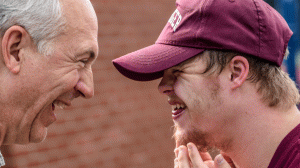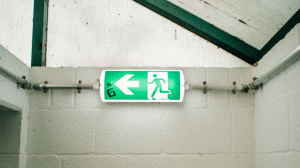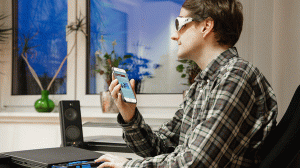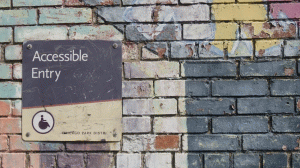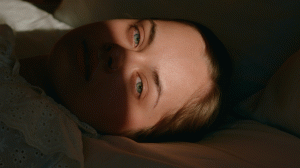POC21 is a global innovation community that got started as an innovation camp to prototype a fossil free, zero waste society. The aim of the 2015 camp was to create sustainable lifestyle technologies and in just 5 weeks, the 300+ person community managed to develop 12 open-source products with a green impact. Their ultimate goal is to overcome the destructive consumer culture and make open-source, sustainable products the new normal.
tbd* caught up with co-founder Daniel Kruse to learn more about POC 21, sustainable living and how we can change the face of modern consumerism. Plus we even have a cheat sheet with tips and tricks from POC21 on how they won 50.000 EUR to make it happen.

How did POC21 get started?
In the very beginning it started as a chat among friends, Dominik, Simon and me. We had built our own businesses in NGO communications and innovation consulting, but were searching for a method with higher impact and a more systemic approach.
We were mostly concerned about climate change and the world´s industry wasting an abundance of resources for the sake of resales and profits. Our goal was then to bring a diversity of makers, designers, engineers and other geeks together and test a new mode of production; aiming for different kind of products: Long-lasting, easy to repair, low on resources and with open-source building plans, to reproduce them locally, anywhere.
What is POC21 doing to make an impact?
The POC21 retreat had a great turnout: There were more than 200 applicants and a lot of media coverage in prior to the exhibition of the final 12 open source products so talking about it is the first act of changing. But it goes beyond this. The incubation session really is a chance to get you thinking about how to really make changes; we had compost toilets on site, waste treatment methods and other co-living mechanisms. Living like this for 5 weeks in a setting that most people have not lived in before begins to break the ties to the typical consumer living.

The incubation is rigorous and combines different skill-sets to make a team unified around one vision. Since the focus is to create something that has a long life and can be used again after it has served its initial function, there is a heavy focus on modular creations that can be edited by the end user with ease. Some of these products are making their way to the marketplace or have since become a tangible product – for example the Solar OSE.
So what exactly are ‘open-source products’ and how do they fit in with POC21?
Open-source (and in our case designed for environmental impact) products are the antithesis of consumer products. While consumerism focuses on the here, the now and the trend, open source products focus on the holistic lifespan of the product. For example, consumerism tells you it’s time to buy a new phone because the trend changes. It does not look at any other deeper motive. Open-source products really look at why you’re making a purchase and if that really is what’s best for you and your needs.
The beauty of open-source technology is they can be edited like an algorithm or code to be enhanced, improved and altered. So in the end, using a 3D printer or other tools for digital fabrication, you can create a product that is specific to your needs.
" Consumerism tells you it’s time to buy a new phone because the trend changes."
The two types of products change consumer habits. While one breeds a live-fast-die-young culture, the other really gets you to think about what it is you need and to be less wasteful – and if you could even become the producer of it again!
Two examples we developed during the camp: “Showerloop” uses 10 times less heat, energy, and water by capturing it in the drain and pumping it directly back to the showerhead, while water is cleaned by an anti-bacterial filter. The German engineering team from “Sunzilla” developed a generator with foldable solar panels for off-grid energy production – plug&play modules enable water purification, cooling, heating and telecommunications, while sparing the noise and emissions of diesel generators.
Any pointers for somebody wanting to change consumerism?
Well, put simply, two groups belong to our consumer culture: the consumer and the manufacturer. You really have to understand how the consumer behaves. For example, down-time is often spent shopping in malls and the like. We´ve been taught and trained by marketing so much, that we believe that just the act of shopping is making us happier and lead more ‘valuable’ lives.
On the other hand, the manufacturer supplies the demand. But since Western markets are more and more saturated, manufacturers have to create the demand to meet their business model: selling more stuff.
Instead of working from the consumerism to the product level, consider how you can invert that to create useful, meaningful products. Although it is more difficult to change manufacturing than everyday consumer habits (there are heavy start-up costs), if this is something you are going to do, really try to integrate meaningfulness and adaptability into your products as much as style and function.
You recently won 50.000 EUR in an award for Social Enterprises. What are your top tips?
UNDERSTAND THE CONTEXT. If you're applying for Advocate Europe, it's important you have an euro-centric focus and a clear theory of change. It´s OK to have just a concept (not yet a prototype), but the path to a new solution and impact must be clear.
CONVINCE AT FIRST GLANCE. Choose a great header image that delivers your message visually and also works together with your strong headline – this is important for public voters to click your idea at all!
DO YOUR HOMEWORK. There are a finite number of questions and characters. Read the whole application through first to avoid repetition, then begin to plan your responses to make the most out of your character count.
REMEMBER: Applications are not a hard and fast science. It takes time and effort and getting your foot in the door is mostly about first impressions. Being clear about what it is you aim to do is also crucial for any application. You won't always come out on top, but when you do, you'll know it was all worth it.
What is next for POC21?
We’re looking to adapt the process of innovation camps to the refugee crisis, turning mere temporary shelters into real habitats worth living. If we look at the worsening situation in Syria, it´s clear that more refugees are coming to Europe and it´s time to “leapfrog” out of the reactive crisis mode and into a long-term, inclusive thinking. In this we plan to engage refugees with meaningful work on open-source, sustainable products, since many are skilled, but are not even allowed to work at the moment.
More long-term is the goal to develop an accelerator program for those products and bring them into the mainstream market. Our ultimate vision is a virtual market place like a mix of Etsy & Amazon, where we can bring the best products together and “democratize” their usage – from buying to lending, from repairing to improving them, we would broaden the accessibility and share the value among all stakeholders involved.
This article was originally published in March 2016.

